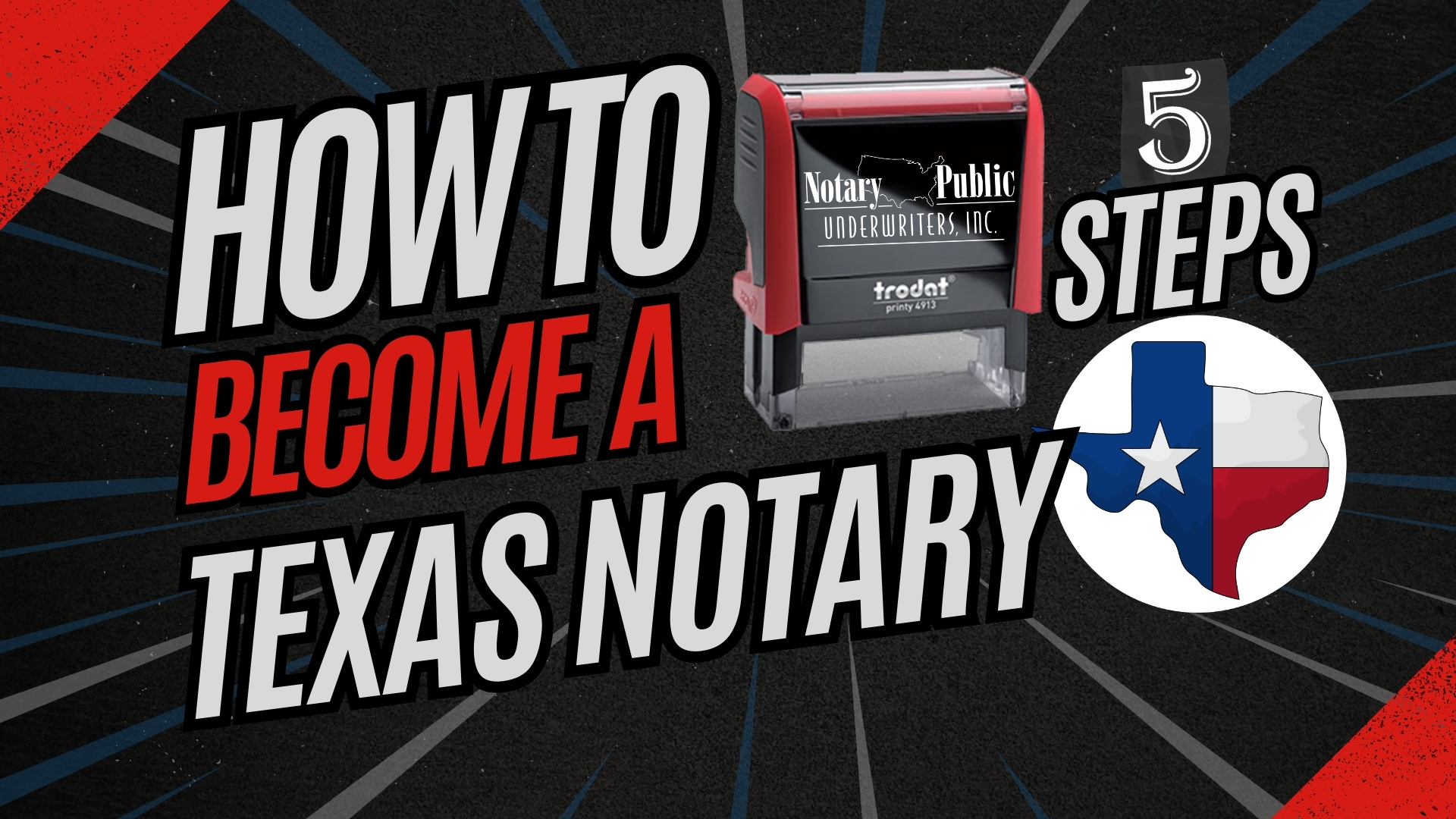How to Become a Notary in Texas
Important Notice: Effective January 1, 2026 all Texas Notary applicants, including renewing notaries, will be required to pay an additional training fee to the Secretary of State and complete a mandatory education course prior to applying. Once the new process is in place, we will update this article.
What Are the Requirements to Become a Notary in Texas?
To become a notary in Texas, you must:
- Be at least 18 years old
- Be a legal resident of Texas
- Texas escrow agents living in an adjoining state are eligible to become Texas notaries without meeting the residency requirement
- Have not been convicted of a felony or a crime involving moral turpitude
Ready to Become a Notary?
GET STARTED
How to Apply to Become a Notary in Texas
If you meet the requirements, follow these steps to apply for your Texas notary commission:
Step 1: Order Your Texas Notary Bond & Supplies, and Complete the Notary Commission Form
To become a notary in Texas, you’ll need to secure a $10,000 surety bond, commonly referred to as a notary bond, from a bonding agency such as Notary Public Underwriters Agency of Texas. This bond protects the public from any financial loss caused by notarial misconduct.
The state of Texas charges a fee for applying to become a notary, and you will also need to purchase a notary stamp and record book to perform your duties.When you visit our Become a Notary page, you will notice that all of our notary packages include the state filing fee, notary bond, notary stamp, and record book—ensuring you don't forget the state-mandated items.
Next, you will need to complete the Notary Public Commission Form through our online process, which will guide you step-by-step to avoid errors. You will confirm the case color of your notary stamp and have the option to add notary E&O insurance and other supplies to your order.
Although not required by law, it's wise to invest in notary E&O insurance. Unlike the notary bond, which protects the public, notary E&O insurance protects you from financial liability due to unintentional mistakes, up to the policy limit. There is no deductible, and you are not required to pay it back. Without this policy, you would be responsible for all expenses related to defending yourself as a notary.
It's also a good idea to become educated on Texas notary public laws and best practices, even though it's not mandated by law. The Secretary of State provides educational materials in accordance with Tex. Gov't Code Ann. §406.008(b) on their website. For a better understanding of the laws and protocols, you should consider taking a notary course, like the one offered by Notary Public Underwriters Agency of Texas. Our course, priced at $25.00, can be conveniently added to your order during the application process.
By taking our course, you will gain a full understanding of a notary’s responsibility in society and the obligation to execute your duties lawfully and ethically. The Texas Notary Course will help you become familiar with the most current notary laws in Texas and fully understand your notarial duties.
Additionally, consider adding the Texas Notary Handbook to your order for $15.25. This handbook serves as a handy reference to notary statutes and administrative rules when you're in the field.
At the end of checkout, you will receive a confirmation page and may download the information provided on that page for your reference.
Step 2: Submit the Application and Bond Details
Once we receive your order, we will review the information and electronically transmit your notary application and bond details to the Secretary of State’s Notary Unit for processing.
Step 3: Electronically Sign and Confirm Application
Upon acceptance of your notary application and bond, the Secretary of State’s Notary Unit will email you a link to create an account on their website. After account creation, you must electronically sign your application, review your information, and upload any documentation requested by the state in determining your eligibility. You have 90 days from the date of acceptance to complete this step. Failure to do so will result in delays and may require you to reapply.
Step 4: Receive Your Certificate and Supplies
Once approved by the Secretary of State’s Office, you will have access to download your notary bond and commission certificate. Please note that you will only be able to download it once free of charge.
Once downloaded, print your commission certificate and take it to another commissioned Texas notary, who will administer the Oath of Office and notarize the document. You are responsible for keeping the notarized certificate on file.
We will begin manufacturing your order and ship it within three business days upon notification of approval from the state.
Step 5: Start Notarizing
Congratulations! You are now a duly commissioned notary public in the state of Texas. Once you receive your supplies, you may begin offering your services to the public—either independently or as part of your profession. If you have any questions about becoming a notary, please contact us at This email address is being protected from spambots. You need JavaScript enabled to view it. or 800.821.0822. We are always happy to assist.
How Much Does It Cost to Become a Notary in Texas?
The cost of becoming a notary in Texas is generally inexpensive. The state filing fee is $21, and our 4-year $10,000 notary bond is $50. You will also need to purchase a notary stamp and a record book to carry out your duties. Prices for these items vary depending on the style you prefer. Here's a breakdown of our most popular package for becoming a notary:
| Item | Cost |
| $10,000 Notary Bond | $50 |
| State Filing Fee | $21 |
| Rectangular Self-Inking Stamp | $26 |
| Notary Public Record Book | $10 |
| $25,000 Notary E&O Policy | $51 |
| Shipping & Handling | $9.95 |
| Total Cost | $167.95 |
How Do I Obtain a Notary Bond in Texas?
Visit our Become a Notary page, where you will be able to purchase the notary bond and other state-required items.
Not a new applicant? Visit our Renew Commission page!
Is Training Required to Become a Notary in Texas?
Training is not required to become a notary in Texas, but the Secretary of State does provide educational materials on their website.
Notary Public Underwriters Agency of Texas also offers a notary course that provides background of information to help you to become a confident and successful Texas notary. This course is accessible 24/7 and can be completed at your own pace in the convenience of your home or office.
Alternatively, you may want to consider purchasing the Texas Notary Handbook. This helpful manual will teach you the nature and purpose of your notarial duties and how to perform them with skill and confidence in accordance with Texas notary statutes and administrative rules.
How Long Does It Take to Become a Notary in Texas?
The timeframe to become a notary in Texas varies depending on how quickly each step is completed and the Secretary of State's processing time. It can be completed in as little as a few days or more than three months.
Which Situations Would the Secretary of State Require Additional Information From Me?
If there are discrepancies between the information you provided and the information the state has on record. Please note that if you have been found guilty of a crime other than a class C misdemeanor, you will need to upload copies of the court order, sentence, and papers pertaining to release from probation, and a statement of the nature, circumstances, date, and location, and whether the case is on appeal. Remember, a conviction for a crime involving moral turpitude or a felony disqualifies you from appointment as a notary public under Texas law.
What Happens If I Don’t Sign the Statement of Officer Within 90 Days?
Your notary application will be considered expired, and you will need to reapply. You may contact our office for assistance.
How Do I Obtain a Replacement of My Texas Notary Commission Certificate?
If you have lost your certificate and need access to download it again, contact the Secretary of State’s Office to pay the $10 fee to be able to access it from your online portal.
Why Does My Notary Certificate and Stamp Not Have the Punctuation After My Middle Initial or Suffix?
Effective January 21, 2025, the Secretary of State’s Notary Unit no longer accepts notary applications with periods after middle initials or suffixes. As a result, your notary commission certificate will be issued without the period, and your notary stamp must match the exact name on your certificate.
If we receive an application with a period after the middle initial or suffix, it will be corrected before being transmitted to the Secretary of State.
What Should I Do if I Move or My Name Changes?
You must notify the Secretary of State of any address change within ten (10) days of the change. You can complete the Notary Public Change of Address form or send a letter with your name, social security number, old address, and new address to: Secretary of State, Notary Public Unit, P.O. Box 13375, Austin, TX 78711-3375. You may also file your change of address online. Failure to update your address may result in the revocation of your commission if you do not respond to a complaint or request for information.
If you recently changed your name, you may change the name on your commission by submitting a name change application (Form 2305) to the Secretary of State, along with your certificate of commission, a rider or endorsement from the insurance agency or surety reflecting the name change, and a $20 filing fee. If you are bonded through Notary Public Underwriters Agency of Texas, please contact us for information on obtaining the rider. The state of Texas does not require notaries to change their name on their commission before their current commission expires.
How Much Can a Notary Charge for Notarial Acts?
Texas notaries may charge up to $10 for most common notarial acts. This fee limit is subject to review by the Secretary of State every five years. Notaries have the option to charge less than the maximum or provide their services free of charge.
How Long Does a Texas Notary Commission Last?
Each notary public commission lasts for a period of four years. In order to continue to be a notary, you will need to renew your commission.
How Do I Renew My Notary Commission in Texas?
To renew your commission, you will need to meet the same requirements, obtain a notary bond and supplies, and reapply. Avoid waiting until the last minute and renew at least 90 days before your current commission expires to avoid any potential delays.
Prepared to take the next step?
Start right with the professional notary package.


